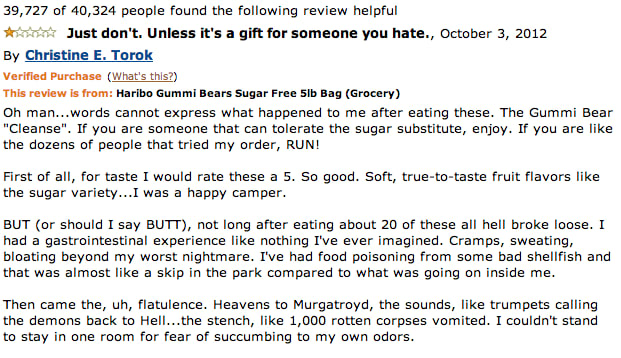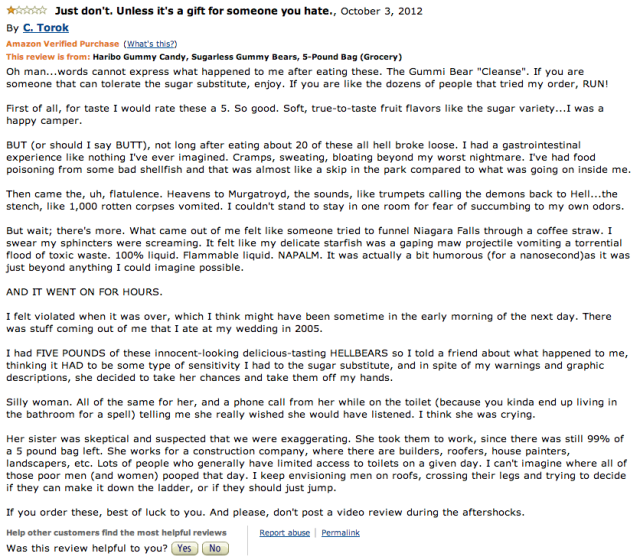Haribo Sugar-Free Gummy Bears have become notorious not just for their fruity flavor, but for the outrageous reviews that highlight an almost comical irony. While marketed as a healthier alternative to regular gummy bears, many consumers have shared their shocking experiences, creating a mix of amusement and caution in the candy aisle.

amazon haribo sugar free gummy bears reviews
What’s the Buzz About Haribo Sugar-Free Gummy Bears?
From startling bathroom emergencies to endless laugh-out-loud anecdotes, Haribo’s sugarless treats have inspired reviews that are anything but ordinary. The infamous reviews, especially on Amazon, have spawned a subculture on forums and social media, where users unite over their mutual experiences with these gummy bears. It’s clear that these sugar-free candies, while delectable to some, come with a rollercoaster of side effects that have startled many consumers.

amazon haribo sugar free gummy bears reviews
The Allure of Sugar-Free: Health Meets Pleasure
As society becomes more health-conscious, the appeal of sugar-free products has led to an influx of alternatives in the market. Sugar-free gummy bears promise the same sweet satisfaction without the calories and carbs associated with traditional candies. Popular among those looking to curb their sugar intake, these gummy bears use maltitol as a sugar substitute, which can be a double-edged sword.

amazon haribo sugar free gummy bears reviews
The Taste Test: Flavor Profiles That Deceive
Many reviews laud the taste of Haribo Sugar-Free Gummy Bears, often comparing them favorably to the original sugar-laden variety. However, the euphoria of a sugar rush quickly turns into dismay for many, as described in a popular review: “First of all, for taste I would rate these a 5. So good. Soft, true-to-taste fruit flavors like the sugar variety… BUT!” This initial bliss is promptly followed by an avalanche of consequences that are far from sweet.
The Unfortunate Aftermath: Consequences No One Wants
It’s not the flavor but the fallout that has propelled these gummy bears into viral fame. Many Amazon reviewers have detailed experiences ranging from mild discomfort to extreme gastrointestinal distress, triggering warnings that resonate with humor and horror: “St. Diarrhea’s Day Massacre” and “See you in hell, Haribo Sugar-Free Gummy Bears” are just two of the striking review titles that summarize the mixed feelings attached to these candies. The anecdotes paint a picture of a product that can induce chaos for the unwary consumer.
Health Experts Weigh In: The Science Behind Sugar Alternatives
Nutritionists and health experts have cautioned about the effects of sugar substitutes like maltitol. Dr. John D. Schwartz, a well-known dietitian, notes: “While sugar alternatives can be beneficial for controlling calorie intake, they can also lead to digestive unrest. The consumption of high amounts of maltitol can indeed trigger bloating and diarrhea. Moderation is key.” This professional insight underscores the importance of understanding what goes into sugar-free products.
Finding Balance in Treats: Strategies for Satisfying Cravings Without Regret
Finding a healthy balance in our diets doesn’t mean depriving ourselves of sweet pleasures. Experts suggest approaches like mindful eating and moderation. Replacing sugar-laden treats with healthier options, such as fruit snacks or small portions of a satisfying treat, is one method to enjoy sweetness without the aftermath of regret. The emphasis on self-love and balance can help people navigate their cravings without falling into extreme pitfalls. As Michelle C. Smith, a holistic health coach, aptly puts it: “Joyful eating means not just what you eat, but how you feel while eating it.”
Haribo’s Response: The Company’s Stance
In light of the unsolicited fame garnered from these reviews, Haribo has attempted to address consumer concerns by providing clearer information about the recipes they utilize and the potential effects of their sugar substitutes. Although public outcry over the gummy bears’ side effects has led to noticeable shifts in product marketing, the company still maintains that while the candies are safe when consumed in moderation, consumer education is paramount.
Conclusion: A Love-Hate Relationship with Sugar-Free Indulgence
Ultimately, the saga of Haribo Sugar-Free Gummy Bears serves as a humorous yet cautionary tale in the realm of sugar alternatives. While the gummies offer a delicious taste that many adore, the underlying consequences call for a thoughtful approach to healthier snacking. As more consumers navigate their dietary choices, it’s clear that sugar-free cravings will remain a contentious yet enthralling topic in today’s health-conscious society.
Frequently Asked Questions
Why did HARIBO discontinue sugar-free gummy bears?
Due to the reactions from consumers regarding gastrointestinal distress, HARIBO decided to rethink its marketing strategy and address the safety concerns surrounding its sugar-free gummy products.
What is the sweetener in HARIBO sugar-free gummy bears?
The sweetener used in HARIBO sugar-free gummy bears is maltitol, which is known to have a laxative effect when consumed in large quantities.
How many carbs are in sugar-free gummy bears?
On average, sugar-free gummy bears contain around 28g of total carbohydrates per serving, with maltitol contributing significantly to this count.
Does HARIBO sugar-free gummy bears contain any sugar?
No, HARIBO sugar-free gummy bears do not contain sugar; instead, they are sweetened with maltitol, making them an option for those reducing their sugar intake.